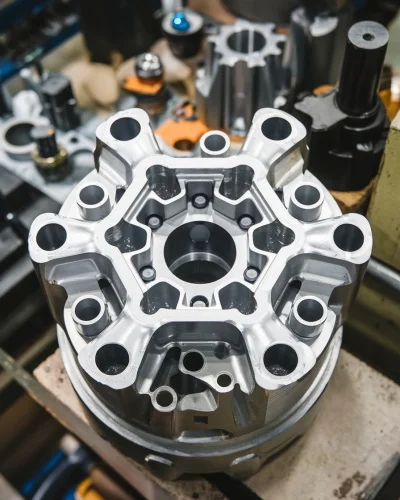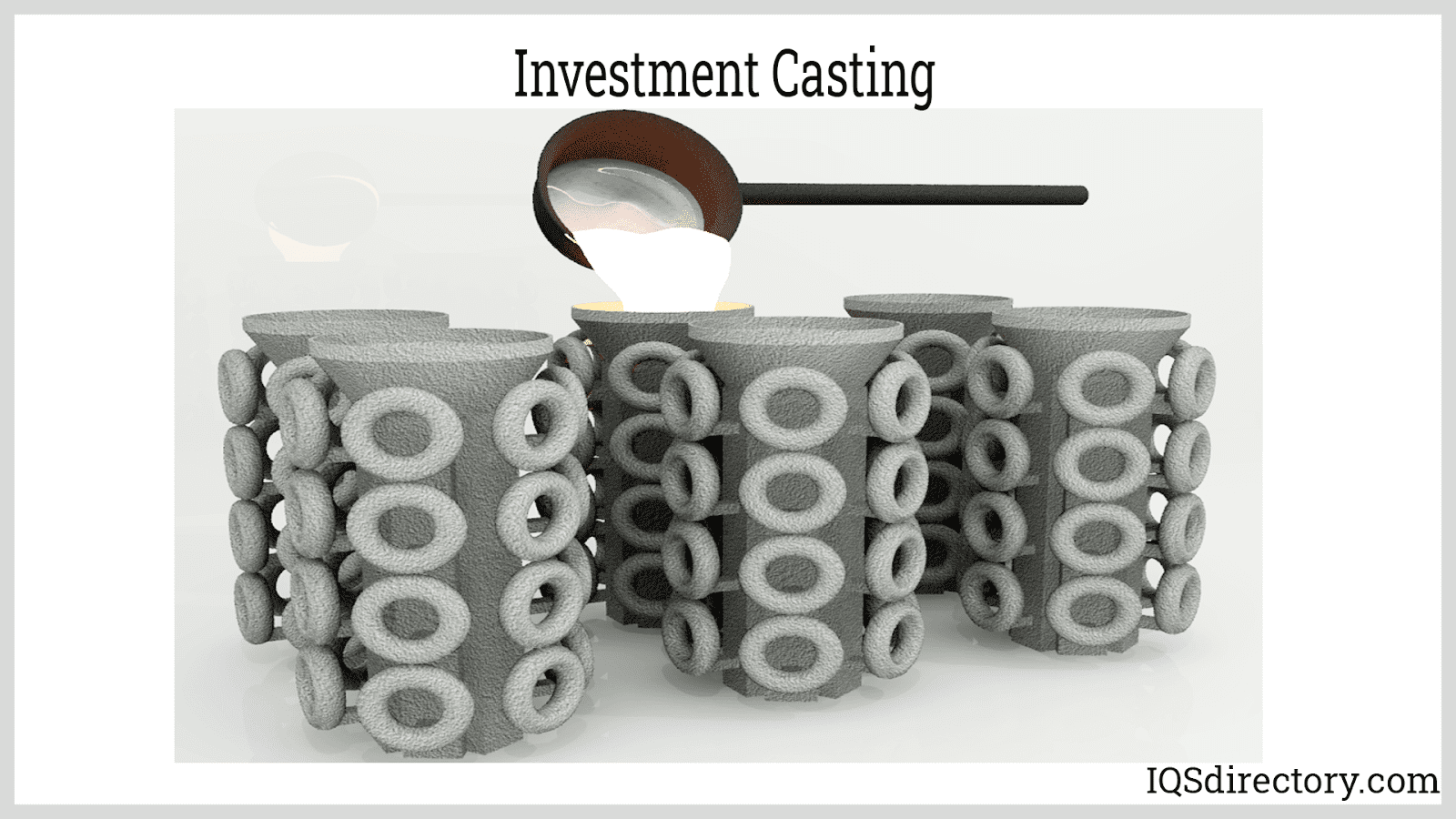Why many industries trust Precision aluminum casting for reliable components
The Future of Aluminum Foundries: Advancements and fads Shaping the Sector
The light weight aluminum foundry market is undergoing significant improvement. Trick fads highlight the value of sustainability and effectiveness. Developments in wise production and automation are becoming widespread. Shops are progressively focused on making use of recycled products. This change raises inquiries about future methods and innovations. Exactly how will these adjustments influence manufacturing methods and market characteristics? The answers may redefine the sector landscape in unexpected ways.
Developments in Smart Manufacturing Technologies
As the aluminum shop sector develops, improvements in clever manufacturing innovations are ending up being progressively necessary for improving performance and performance. The integration of automation, expert system, and the Internet of Things (IoT) is transforming conventional factory operations. These innovations make it possible for real-time surveillance of procedures, enabling immediate adjustments that optimize output and minimize waste.
Equipment discovering algorithms assess production data to recognize patterns and forecast maintenance needs, lessening downtime. Robotics are increasingly employed for recurring jobs, freeing skilled employees to concentrate on more complex obstacles. In addition, digital doubles-- online designs of physical processes-- promote simulations that can boost style and operational methods.
The fostering of these smart production innovations is driving affordable advantages in the aluminum factory field. By enhancing workflows and boosting decision-making abilities, foundries can fulfill growing market needs while keeping high-quality standards. The future of aluminum factories is indisputably linked to these technological innovations.
Welcoming Eco-Friendly Products and Processes
The light weight aluminum shop market is significantly concentrating on environmentally friendly products and procedures to enhance sustainability. This shift consists of the fostering of sustainable product sourcing, energy-efficient production strategies, and efficient recycling and waste monitoring techniques. By incorporating these practices, factories intend to decrease their environmental effect while maintaining competitiveness out there.
Lasting Product Sourcing
Just how can light weight aluminum foundries enhance their sustainability initiatives? Lasting product sourcing has actually become a vital approach in achieving this goal. By prioritizing recycled light weight aluminum, shops can greatly decrease their ecological impact, as recycled products call for much less power and less sources contrasted to primary aluminum manufacturing. Furthermore, sourcing materials from certified suppliers that comply with green techniques advertises responsible mining and lessens environmental effect. Foundries are also checking out alternate materials, such as biopolymers and green finishes, to enhance traditional aluminum procedures. Teaming up with stakeholders, consisting of distributors and environmental organizations, fosters development in sourcing techniques. Ultimately, embracing lasting product sourcing not just straightens with global sustainability goals but likewise positions aluminum factories as leaders in eco liable production.
Energy-Efficient Production Techniques
Light weight aluminum factories are significantly taking on energy-efficient manufacturing methods to match their sustainable product sourcing campaigns. These methods concentrate on minimizing energy usage throughout the production process. Advanced innovations, such as induction melting and maximized spreading processes, are being implemented to minimize the total carbon footprint. In addition, automation and wise production systems enhance functional performance, enabling far better energy monitoring. Factories are also exploring the combination of renewable resource resources, such as solar and wind, to power their procedures. By prioritizing energy efficiency, light weight aluminum factories not just lower manufacturing prices but likewise straighten themselves with global sustainability objectives, making certain a much more eco responsible strategy to aluminum manufacturing while satisfying the climbing need for environment-friendly techniques in the industry.
Recycling and Waste Management
Accepting environment-friendly products and processes, light weight aluminum shops are focusing on recycling and waste monitoring techniques to improve sustainability in their operations. By integrating closed-loop systems, these facilities are reducing waste and making best use of source efficiency. Scrap aluminum, a readily available product, is being reused on-site, considerably lowering the demand for virgin products and decreasing power intake. Technologies in arranging and processing modern technologies better facilitate the recycling of aluminum, making sure that also polluted materials can be repurposed successfully. In addition, shops are taking on lasting methods such as decreasing contaminated materials and advertising making use of biodegradable products for product packaging. This dedication to reusing not just reduces ecological impact but also improves the economic feasibility of aluminum factories in an open market.
The Role of Automation and Robotics
Automation and robotics are increasingly transforming the aluminum shop sector, substantially enhancing manufacturing performance. By integrating sophisticated innovations, foundries can reduce labor costs while concurrently boosting security criteria for their workforce. This shift not only simplifies procedures however also places the market for sustainable development in an open market.
Boosted Manufacturing Efficiency
Revolutionizing manufacturing processes, the integration of innovative robotics and automation modern technologies has ended up being a foundation for light weight aluminum shops seeking boosted effectiveness. These developments streamline process, minimize cycle times, and improve item quality by lessening human mistake. Automated systems can keep track of assembly line in real-time, permitting for prompt adjustments that enhance result. Additionally, robotics help with the handling of unsafe materials, ensuring safer functioning settings while increasing throughput. Predictive maintenance technologies likewise add to effectiveness by preparing for equipment failures, therefore decreasing downtime. As an outcome, light weight aluminum foundries can attain higher uniformity in their products while responding a lot more promptly to market needs. This welcome of automation is establishing a new requirement for efficiency and operational excellence within the sector.

Lowering Labor Prices
The shift towards advanced robotics and automation in aluminum foundries not just enhances production efficiency but also plays a significant function in decreasing labor costs. By integrating automated systems, factories can decrease the dependence on hand-operated labor, which frequently involves high salaries and training expenditures. Robotics enhance recurring tasks such as pouring, molding, and ending up, permitting for a greater output with fewer personnel. This technical modification not just reduces labor-related costs yet also boosts uniformity and high quality in production. Furthermore, automation can operate all the time, taking full advantage of operational hours without the linked expenses of overtime or shift differentials. Consequently, aluminum factories can achieve substantial cost savings while preserving competitive pricing in an advancing market landscape.
Improving Safety And Security Standards
While standard light weight aluminum foundry operations often subject employees to dangerous settings, the integration of robotics and automation considerably enhances security standards within the market. Automated systems can execute high-risk tasks, such as liquified helpful site steel handling and heavy lifting, reducing human exposure to hazardous problems. Additionally, robotics can operate in severe temperature levels and harmful environments, effectively lessening the threat of injury. Advanced checking technologies and fabricated intelligence warranty real-time safety assessments, permitting instant feedbacks to potential dangers. Moreover, automation simplifies process, lowering the likelihood of accidents triggered by human mistake. Because of this, the fostering of these modern technologies not just boosts safety however also promotes a much more effective and effective working setting in aluminum shops.
Enhancing Energy Effectiveness in Manufacturing
As light weight aluminum shops look for to keep competitiveness in a progressing market, improving energy performance in production has actually become an essential emphasis. By taking on sophisticated modern technologies such as high-efficiency melting heaters and automated temperature controls, foundries can especially lower energy consumption. Carrying out real-time surveillance systems enables accurate tracking of power usage throughout the production procedure, allowing quick adjustments to optimize efficiency.
In addition, moving to alternative power sources, consisting of sustainable options, can additionally reduce the carbon footprint. The assimilation of energy recuperation systems, which recover waste heat for reuse, is coming to be progressively typical. Educating workers in energy monitoring practices assures that everyone associated with the production procedure is conscious of energy use.
These initiatives not just lower functional prices however additionally align with global sustainability objectives, positioning aluminum foundries as accountable gamers in the market while boosting their overall competitiveness. - Precision aluminum casting
Innovations in Recycling Aluminum
Advancements in reusing aluminum have actually obtained momentum along with efforts to improve power efficiency in production. The light weight aluminum sector has embraced sophisticated technologies that simplify the reusing process, decreasing energy usage and ecological impact. Techniques such as hydrometallurgy and new sorting modern technologies enhance the extraction of light weight aluminum from scrap, boosting return prices and ensuring higher quality recycled material.
The development of closed-loop recycling systems permits foundries to recycle light weight aluminum without considerable deterioration in top quality, making the procedure more sustainable. Developments in logistics and collection, consisting of improved monitoring systems and automated sorting, have actually additionally played a necessary function in increasing the efficiency of light weight aluminum recovery. These innovations not just add to a circular economic situation however additionally assist alleviate the carbon footprint connected with light weight aluminum manufacturing. As the need for lasting methods expands, these advancements position the aluminum shop market as a leader in responsible source administration.
Replying To Market Demands and Customer Trends
Flexibility has actually ended up being a cornerstone for light weight aluminum factories replying to advancing market demands and consumer fads. As markets increasingly focus on sustainability, aluminum shops are moving towards eco-friendly methods, including boosted reusing processes and lowered carbon footprints. This change lines up with customer preferences for eco responsible items, driving foundries to innovate their offerings.
In addition, the surge of lightweight products in vehicle and aerospace markets necessitates innovations in aluminum alloys and casting techniques. Shops are purchasing research study and growth to produce high-strength, light-weight parts that meet rigid efficiency standards.
Modification has obtained traction, with consumers seeking customized remedies. Aluminum factories are leveraging innovative production technologies, such as 3D printing, to suit particular customer needs effectively. This responsiveness not only satisfies consumer demands however likewise positions light weight aluminum shops competitively in a vibrant market landscape, guaranteeing their relevance in an ever-changing industrial environment.

Often Asked Concerns
How Do Aluminum Foundries Influence Citizen Economies?
Light weight aluminum foundries substantially affect local economic climates by creating tasks, boosting need for local providers, and contributing to community growth. Their procedures often lead to increased tax earnings, which can money necessary public solutions and framework improvements.
What Are the Security Laws for Light Weight Aluminum Shop Workers?
Safety and security regulations for aluminum foundry employees consist of compulsory personal safety devices, correct ventilation systems, normal training on dangerous products, and adherence to guidelines established by work wellness and security managements to lessen threats and assurance employee safety. - Aluminum Casting Company
How Does Light Weight Aluminum Recycling Affect Global Supply Chains?
Aluminum recycling considerably lowers demand for raw products, improves source effectiveness, and stabilizes costs. This shift effects global supply chains by fostering a round economy, promoting sustainability, and ensuring a much more resistant sector in varying markets.
What Occupation Opportunities Exist in the Light Weight Aluminum Foundry Market?
Numerous job opportunities exist in the light weight aluminum factory market, consisting of functions in engineering, quality control, go now manufacturing management, and research study and growth. Knowledgeable labor wikipedia reference positions such as mold manufacturers and equipment operators are likewise popular.
Just How Do International Trade Plans Impact Aluminum Foundries?
International profession plans greatly impact aluminum foundries by affecting import tariffs, supply chain dynamics, and market access. These variables can affect functional prices, competition, and total productivity within the global aluminum manufacturing landscape.
By prioritizing recycled aluminum, shops can substantially reduce their environmental footprint, as recycled materials call for much less power and fewer resources compared to main light weight aluminum manufacturing. Light weight aluminum factories are progressively taking on energy-efficient manufacturing methods to match their sustainable product sourcing campaigns. Automation and robotics are increasingly changing the aluminum shop industry, significantly enhancing production efficiency. The shift towards progressed robotics and automation in light weight aluminum foundries not only enhances production performance but likewise plays a considerable function in minimizing labor costs. As light weight aluminum shops seek to preserve competitiveness in a developing market, enhancing power efficiency in manufacturing has arised as an essential focus.